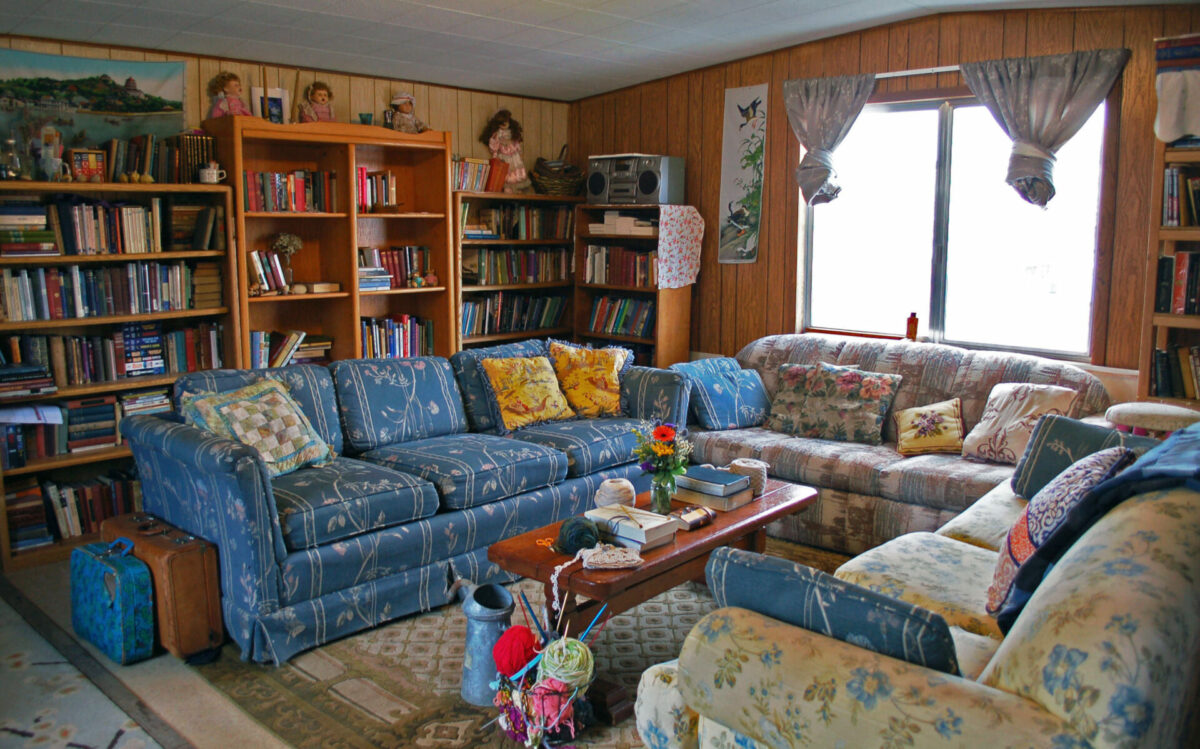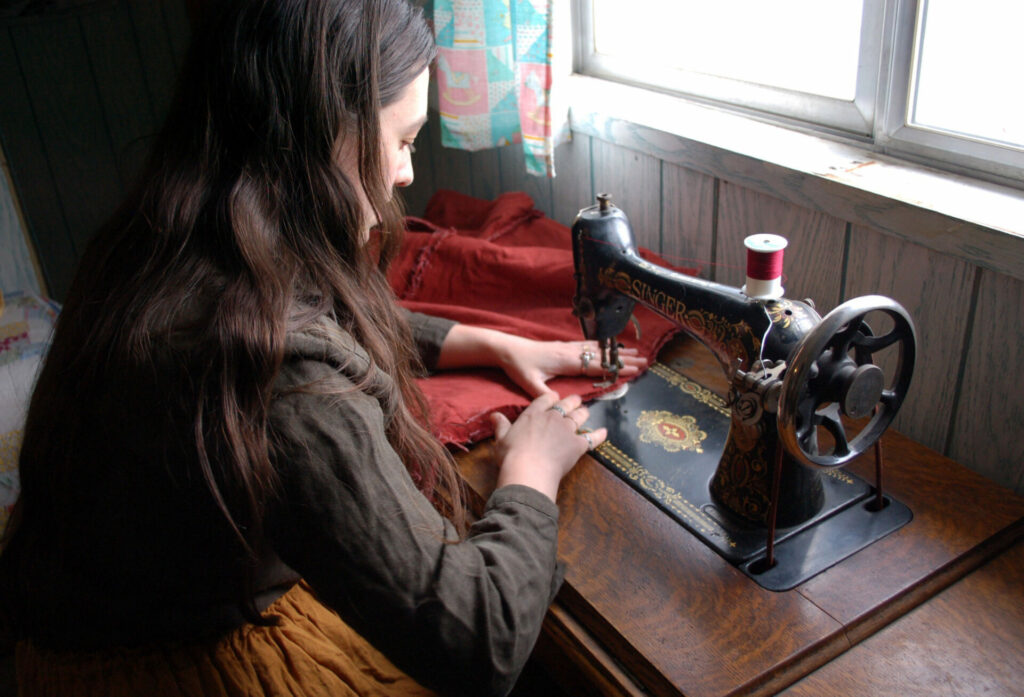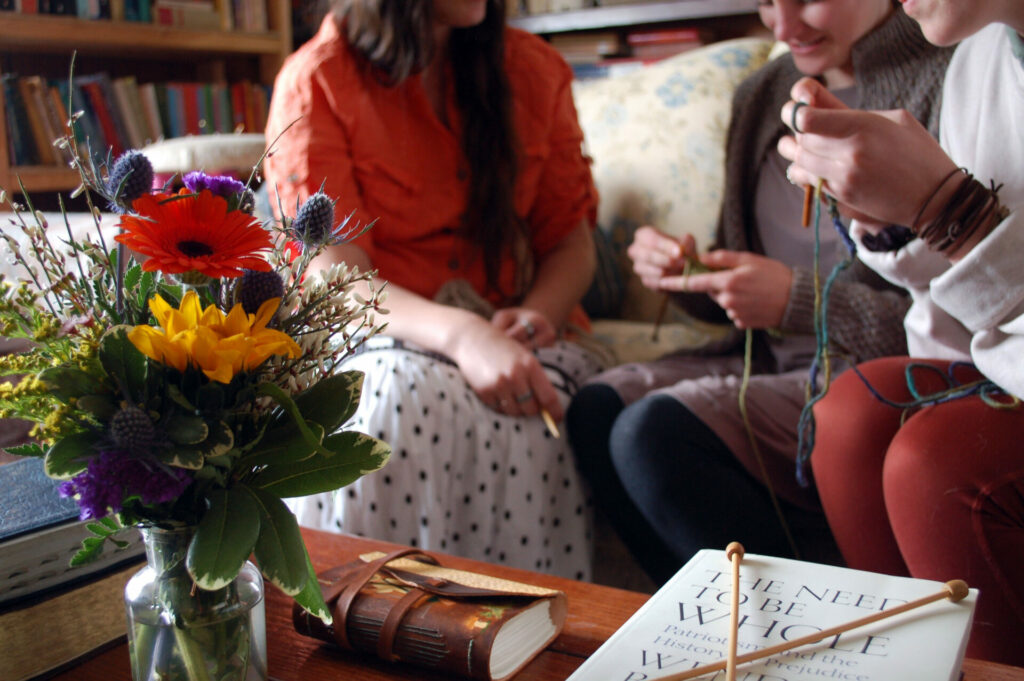Bozeman, MT. I don’t remember a time when I haven’t told stories or sewn clothes. I certainly never thought of these things as hobbies. Such undertakings were my passion, even if a chore, and they led me and continue to draw me closer to friends and community. I was twelve years old and looking for ways to save money for a hope chest when I found fifty-four dollars cash in a parking lot. I used that money to buy embroidery supplies and then called onto a radio program once a week offering hand-embroidered tea towels in trade for books or cash. I got plenty of both, and I learned many valuable lessons through that experience – among them that it isn’t enough to be as lucky as I was, but that my success was found by jumping on presented opportunities to secure enduring blessings.
I self-diagnose as a workaholic, but really I work solely for the gift of leisure. I’ve spent much of my twenties living as a gypsy and proving that a young woman could be both conservative and adventurous, and I’ve done all this without a social security number or birth certificate. I’ve always lived in this sort of paradox where my family thought I was quickly turning into a feminist because I loved math and books and where my friends believed me weird because I had no desire to trade my home-made dresses for ripped jeans. I felt very much like an odd ball until I discovered the “trad” community on twitter.
“People are larping to be… like me!?”
For someone who never cared about fashion, it was startling to suddenly be the fad.
I ran a cleaning business for about nine years, but throughout that time I prioritized my visions above the daily grind. When an opportunity arose, I didn’t hesitate to let my clients know I’d be gone for a few months. They were sorry to see me go, but because they loved me and loved how I worked, I knew I’d have work when I returned.
I volunteered for Above Rubies off and on, helped plan friends’ weddings, flew to writer’s conferences, and eventually went to Germany for a half year as an au pair. There I learned to drive and taught young children how to knit. I made many friends in Germany, and they found me fascinating because I laughed more quietly and sincerely than the stereotypical Barbie-doll American they expected. We would take road trips and discuss personal values and God, and I would show my friends how to play a hymn on the piano or buy them needles and yarn and help them make something for themselves. I still talk to these people, and I love when they send me pictures of projects they have continued to work on. I also discovered Montessori schools and shortly after returning to the states started teaching basic sewing and embroidery classes. But this was just the beginning of my travels.
When COVID began I refused to acknowledge the chaos. I hosted knitting socials at my house and threw the biggest 4th of July party of 2020. I couldn’t fly, so I discarded my shoes and road tripped cross country, for months at a time, going where I wanted. Nobody cared to stop me and ask where my mask or vaccine card was because they were too busy pointing at my bare feet or admiring my current piece of embroidery or tatted lace. These road trips would last for about three to five months, and I always returned with a few more fulfilled dreams and a larger understanding of community and hospitality.
I soon made a name for myself among my friends: If ever anything was needed it was probably in my car, whether glue or herbs or a nice story. Maybe even something to eat. Visiting friends would mean I would end up helping with a variety of chores, and sometimes stealing my friends away to carpool to other places. I took a short trip to NYC with two of my best friends and on the way back one of them said, “I wish you were my mother.” I continued to teach skills among the people I visited, helped organize friends’ weddings by altering or ironing outfits and helping with food preparation, or simply directing people, and I have gone and stayed with most of these friends for a couple weeks after their first child was born.
Throughout this all I began to notice a desperate need among young women. I would hear things like, “I want to be a wife and mother, but I can’t even keep my own room clean.” I would see young mothers that simply didn’t even try to keep their homes tidy because “cleaning isn’t my gifting.” Young girls lamented, “I wish my grandmother had taught me to make my own clothes. She knew how, but I guess she didn’t think it was important anymore.”
I would tell these women, “I know how. Let me show you.” And while traveling and visiting other homes I’d leave behind a little bit of this skill and a little bit of that. Have you ever seen the joy in a woman’s face when she makes her first knitted stitch? No matter how old she might be, seven years old or fifty-five, it’s the same. I am a woman after all. My fingers have not failed my femininity.
Deeply ingrained in each of us is the belief that we are meant to repair every emergency tear with thread, herb, or handkerchief. But how? How are we to even begin? YouTube isn’t sufficient. These are skills meant to be learned by touching hands with another woman, preferably a female relation or community member. And many young girls want this guidance desperately. Many of these young women were raised by reactionary mothers that value home-keeping, but they, too, were struggling to practice things alone they were never taught. The daughters have seen the struggle and the desire, and they want success.
About two years ago I was chatting with Nancy Campbell, editor of Above Rubies. Her two current volunteers were frustrated because of their lack of domestic skills, and I had jokingly said, “Just come visit me for two weeks.”
Mrs. Campbell said, “Keturah! You should open your home up for a girls’ school.”
I laughed. Because I knew she was right, and because the gypsy inside of me didn’t want to commit to such a noble task. I said I couldn’t. But for a year she would ask me, “Have you changed your mind?”
I remember one day feeling overwhelmed. My kitchen wasn’t terribly messy. I just didn’t feel like cleaning. I called up a friend, “Want to come over and have tea? I need someone to sit at my table while I clean.” Taking our projects to each other’s houses became a regular occurrence among my friends. Or maybe a friend wanted me to come over to hold the baby for an hour so she could deep clean the fridge and oven. We slowly built community among ourselves by being honest with each other, and we are happier for it. And here I was benefitting with this large, comfortable house and no children as an excuse, and so many young girls begging for an opportunity to simply learn to sew a straight line by hand.
At last, I called Mrs. Campbell. “I am turning my home into a school for girls.”
The Living Room Academy is my extraordinary school for girls. Settled at the base of many mountains in Montana, it is for the stay-at-home daughters of three hobbies: stamping cards, binging Janette Oke novels, and taming bunnies. It is for the young women who never had a home yet still know the shame of not feeling feminine enough. This course is for all young women who desire to be the queen of a home where all strangers feel unexpectedly welcomed. And oddly enough, it is for the girls that dream of being bold and wild, too. What is it that properly empowers a woman? When the virtuous woman is equipped with dignity, grace, and compassion she moves where everyday things happen and rests in the delights of old-fashioned ideals. Her soft, vigorous presence is her greatest power.
It is daunting to envision running a pleasant, blessed household. This is why we’re not meant to do it alone. Women are meant to flock together, with their words and their hands, to keep one another safe and to make the world more joyful.
I am passionate about this project and the integrity of appropriating traditional skills to the ways of modern living. I do not want this experience to be corrupted by money or for it to become a long-term establishment. This is a home course that will not be turned into material to be sold later… If this is meant to spread, other women will open up their homes. As soon as I have my own family, the way this course is currently orchestrated will cease. It is not a business venture. And because of that, I want girls to feel that this experience is more important than any funding they might lack. If you, too, feel that what I’m offering is important to the future of families, then I encourage you to find a young woman to sponsor, or to reach out to me to see if some young woman needs financial aid.
Up to six young women, ages fourteen to thirty, will be accepted for two weeks. Together we will rise with the sun and go to bed at a decent hour. The girls will witness spontaneous hospitality and in turn understand how to be considerate, thoughtful hosts. We will clean and cook and take afternoon walks, and in the evening we will read and knit. At the end of the two weeks, they will leave with several things they have sewn by hand and by machine, with touches of embroidery, and much encouragement to do more. They need no experience before coming but will leave feeling adequate.
Hosting the school in my home will safeguard the naivety behind my vision. It will remain my cozy home, full of thick books and floral couches and good conversations over beautiful handwork. But for a little while, a few young women will have the opportunity of living with me, of being refreshed and pointed toward a tangible, whimsical reality.
Images by author.







8 comments
michael
Interesting. How did you manage to make it to Germany without a passport?
Keturah Lamb
I have a passport! I also travel and speak on how to legally get passports and banking accounts without a social security number! There’s more information on my blog.
Willliam Smith
Lovely bit of rebellion this!
Thanks!
Keturah Lamb
Aww, thanks!
Martin
Truly an inspiring story. Best wishes for the new venture/adventure.
Keturah Lamb
Thank you!
Rob G
Thank you for this — do you realize how subversive it is? 😉
My sister works with a home for single moms-to-be and single moms of infants. I am going to pass this on to her, as I think that she will find many of these insights helpful.
Keturah Lamb
Haha! Now that you mention it…
Thank you!! I appreciate that so much!
Comments are closed.